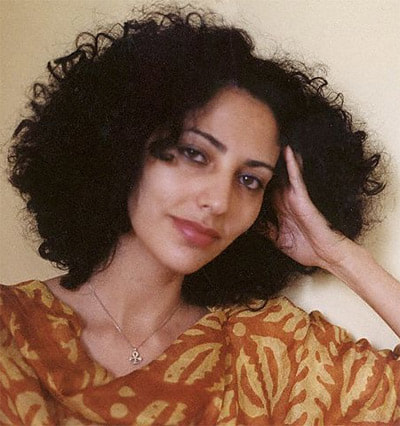|
Suheir Hammad, the child of Palestinian refugees, immigrated with her parents to Brooklyn, New York City when she was just 5 years old. She was heavily influenced by the vibrant hip-hop scene and the stories she learned of family’s experience in the 1948 Palestinian exodus. For Suheir Hammad and the rest of the country, life was altered after the September 11th terrorist attacks. In response, she drafted a piece titled, “First Writing Since” which detailed her reactions to the attacks. She emailed it to a few friends and the poem took on a life of its own, traveling across the country and ending up on several websites until it reached the casting scouts for HBO’s “Def Poetry Jam”. Suheir Hammad, a Brooklyn-reared Palestinian American, read her piece “First Writing Since” in the 2001 premiere of “Def Poetry Jam”. Since that moment, she has gone on to perform original works on tour, had a role in the Palestinian film Salt of this Sea (2008), and published various works. Her perspectives as an immigrant, a Muslim and a Palestinian, and as a woman are weaved to form the narrative styles that stimulate her poetry. Poem 1: "First Writing Since"Spoken word poetry provides a platform for activists to challenge power structures that perpetuate stereotypes, spread prejudicial rhetoric and attempt to silence the identities and experiences of minorities. After the September 11th terrorist attacks, there was rampant xenophobia and Islamaphobia, especially surrounding those of Middle-Eastern and Muslim identity. Hammad’s spoken word poem, “First Writing Since” is a direct response to the pain she felt both as a New Yorker and as a Muslim woman. The imagery is vivid and one can imagine standing on the streets looking up at “sky where once was steel, smoke where once was flesh,” (Hammad). Media following the attacks, homogenized Middle Eastern identities, vilifying them all as radicalized terrorists. Coupled with the lack of positive media representation in television and film led to a minimizing of entire identities composed by their experiences and identifications to harmful stereotypes. In the poem she cries, “please don’t let it be anyone who looks like my brothers,” (Hammad). One of her brothers was in the Navy but she carries the fear that Americans will label her brothers as terrorists because of the color of their skin. Hammad also addresses the construction of social narratives that exclude and make an enemy from anyone not protected by Whiteness. One person’s actions being representative of an entire group is an ideology that white people exclude themselves from. Hammad comments, “we did not vilify all white men when McVeigh bombed Oklahoma” and questions “why is it when we talk about holy books and hooded men and death, why do we never mention the KKK?” Hammad is challenging the cultural attitudes of white people in America. The discourse created around Middle-Eastern people after 9/11 is hateful and vilifying. Hammad, in her first writing since the event is terrified of the effects that it will have on her family and her city of New York. Poem 2: "Not Your Erotic, Not Your Exotic"In this poem, Suheir Hammad speaks against the fetishizing of women of color. The performance challenges reductive stereotypes that women of color face in Western culture. She says, “Women everywhere are just like me–some taller, darker, nicer than me, but like me just the same,”. She notes that although women of color are considered “exotic” to white men, there are actually many women who look and share a culture similar to her own. In this stanza she creates a sense of solidarity among women of color. She goes on to note the perversity of the way women of color are treated. This fetishization is not love it is “in fact nasty necrophilia cause my beauty is dead to you I am dead to you,”. The way men eroticize women of color is them chasing a reductive stereotype, not choosing a relationship with a living woman. Listing the common tropes that plague women from various cultures she finally ends with the potent words, “Not your erotic, not your exotic” to finalize that she and other women of color are living, breathing, strong women and not fantasies for men.
2 Comments
|
ENGL4302 Spoken Word Poetry & Pedagogy at LSU ArchivesCategories
All
|

 RSS Feed
RSS Feed